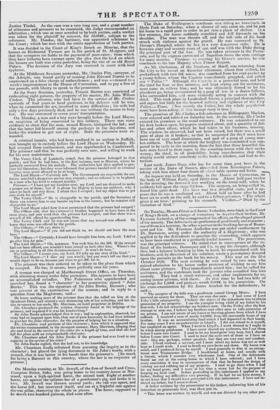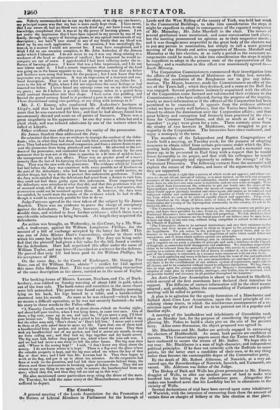On Tuesday, Messrs.Oliver and James A nderdon, were tried, in
the Court of King's Bench, on a charge of conspiracy to deprive their brother, Mr. Freeman A nderdon, of the management of his affilirs, on the alleged ground of his insanity. The defendants are gentlemen of good family and character; one of them is a barrister, the other a partner in the banking-house of Bosan- quet and Co. Mr. Freeman Anderdon was put under confinement by Dr. Burrowes, acting under the authority of a Magistrate ; who was applied to by the defendants to sanction the proceeding, which appears to have been conducted in a perfectly lawful manner. The prosecutor, was the principal witness. He stated that in consequence of the re- fusal of his bankers, Bosanquet and Co. to pay his cheques, although they.had a balance belonging to him in hand, he expostulated with his brothers, and, by direction of his solicitor, wrote a peremptory demand upon the partners in the bank for his money. This was on the 31st October 1829. The next evening he was seized by two men, who gained admission to his house under pretence of wishing to see him about some pictures. They immediately seized him ; but lie called for assistance, and the watchman took the persons who assaulted him into custody. They had a strait waistcoat, and other implements for se- curing insane persons, with them. At that time he bad two bills of exchange for 1,000/. and pictures worth 3,000/. in his possession. On his cross-examination by Sir James Scarlett for the defendants ; he said- " The acceptor of the bills was a gentleman named George Monro. I have received no money for them. They are over-due now. I had some of Lord Foley's bills subsequently. I believe the object of the defendants was to'obtain possession of my property. I am the youngest living child of my father by his first wife. I do not acknowledge my brothers now. On the Friday after the first attempt to seize me, I believe my brothers sent other men to take possession of may person. I am not aware of any lenses or burning-glasses from which I have suffered. I received a sum of nearly 14,0001. from the mercantile house of my brother. It was an accumulating fund which I had deposited in their hands. For many years I was an underwriter at Lloyd's. I did not attend to it myself, but employed an agent. When I went to Lloyd's, I went dressed as I ought to be when among gentlemen. I have never shaved my eyebrows, but I cut them before I came into Court. I used to let my beard grow very long, but 1 shaved before I came into Court. I used to wear the same sort of shoes as I have on now : they are, perhaps, rather peculiar, but they are very easy and comfort- able. I lived without a servant, and I must admit my house was not so well kept as I could wish. I used to brush my own boots and shoes. My house was small, and I preferred living by myself. I used generally to dine at an eating- house near Westminster Bridge. I breakfasted at home, and usually took a biscuit, which I consider very wholesome food. One of the defendants found me out at the eating-house to which I have referred ; and I have every conviction it was in consequence of that that be formed the design of ruining ine,and robbing me of my property. I used to go there when I had let my beard grow, and I wore at hat time a straw hat for the purpose of keeping may head cool. Before proceeding in this indictment I applied to my father, finding my difficulties very pressing: If he had let me have money? I do not know that I should have proceeded with this indictment. • I have not in- dicted my father, but I mean to flu so." A.letter written by the prosecutor to his father, informing him of his intention to prosecute him, was then put in. "This letter was written by myself, and was not dictated by any other per- ann. Nobody recommended me to cut my hair short, or to clip my eye-Mows; my principal reason was that my hair is more easily kept clean. I have never, that lam aware df, had my blood very nearly dried up; nor have I ever, to my kraus/ledge, complained that it was so by the power of burning glasses. I am not under the impression that I have been injured in my person by any of my family, through the agency of burning-glasses, or any optical instruments of any description ; not haveNI ever stated to any of my. family that my blood was dried up by any such application. On one occasion, I was exceedingly dis- tressed, in a manner I could not account for. I may have complained, and I think I did on one occasion complain, to Mr. John Anderdon of the distress under which I laboured. I do not mean to say it was any thing relating to a weakness of the head or aberration of intellect ; but I requested he would ac- company me out of town. I apprehended I had been suffering under the in- fluence of burning-glasses. I know that was a false impression, and I do not now labour under it. I bad a remote impression' that something of the kind was going ou in the house opposite to me. My impression was that my father and brothers were using that house for the purpose ; but I now know that that impression was quite erroneous. It was an impression of a transient and con- fused description. That is not what I am going to indict my father for. I went to the Isle of Wight, where I did not experience the same feelings as had haunted me before. I never found any nutmegs come out on my skin through my pores ; nor do I believe it possible that nutmegs taken in a grated form could contract themselves into that shape. I have eaten rice pudding, and fancied the grated nutmeg found in it produckd a pain in my side ; since which I have discontinued eating rice-pudding, or any thing with nutmegs in it."
Mr. T. C. Emery, who conducted Mr. Anderdon's business at Lloyd's, said that he had paid him upwards of 10,0001. during thirteen years that he was concerned for him ; and that he had always found him uncommonly shrewd and acute on till points of business. There was a great singularity in his appearance : be one day wore a white hat and a plaid cloak, and was refused admission by one of the waiters when he called at Lloyd's.
Other evidence was offered to prove the sanity of the prosecutor. Sir James Scarlett then addressed the Jury.
He submitted that there was no evidence to impugn the conduct of the defen- dants; who, in what they had done, had really been actuated by the kindest mo- tives. They had acted from motives of compassion, and from a sincere desire to pre- vent the prosecutor from being plundered and ruined. He adverted to the evi- dence of the prosecutor, and contended that it was clearly shown by his own statement that he was not at the time in question in a fit state of mind to have the management of his own affairs. There was no greater proof of a man's insanity than the fact of his fancying that his family were in a conspiracy against him. That was the case with the prosecutor. The evidence which he himself had laid before the Jury was consistent with every possible act of kindness on the part of the defendants ; who had been actuated by no sordid motive, no sinister design, but by a desire to protect this unfortunate gentleman. Unless the Jury were satisfied that the defend Ants had acted from a design to ruin him, they could not find them guilty upon this indictment. Even supposing that the defendants were mistaken in what they did, and that this gentleman was not of unsound mind, still, if they acted honestly and not from a bad motive, this prosecution could not be sustained against them. If, however, the Jury were not satisfied, he would state the nature of the evidence which he had to offer, though it would be extremely painful for him to do so.
JudgePatteson agreed in the view taken of the subject by Sir James Scarlett. There was no evidence to prove the charge of conspiracy against the defendants. The Jury, however, demurred for a consi- derable time, and wished to hear further evidence • which there was a considerable reluctance to bring forward. At length they acquitted the defendants.
An action was brought, on Wednesday, in this Court, by a Mr. Wan- sell, a tradesman, against Sir William Langhorne Phillips, for the amount of a bill of exchange accepted by the latter for 300/. This was one of John Minter Hart's transactions, similar to those with which his name has lately been mixed up. The Jury not being satis- fied that the plaintiff bad given a fair value for the bill, found a verdict for the defendant. Hart had negotiated this affair under the name of WilliaM Taylor, and was himself examined us a witness for the defence. He proved that only 151. had been paid to Sir William Phillips, for his acceptance of 3001.
On the seine day, in the Court of Exchequer, Mr. George Pitt Rose, son of Sir William Rose, obtains.' :t verdict for 1451. against this same John Minter Hurt. This was another swindling transaction of the same description as the above, carried on in the name of Taylor.

















 Previous page
Previous page